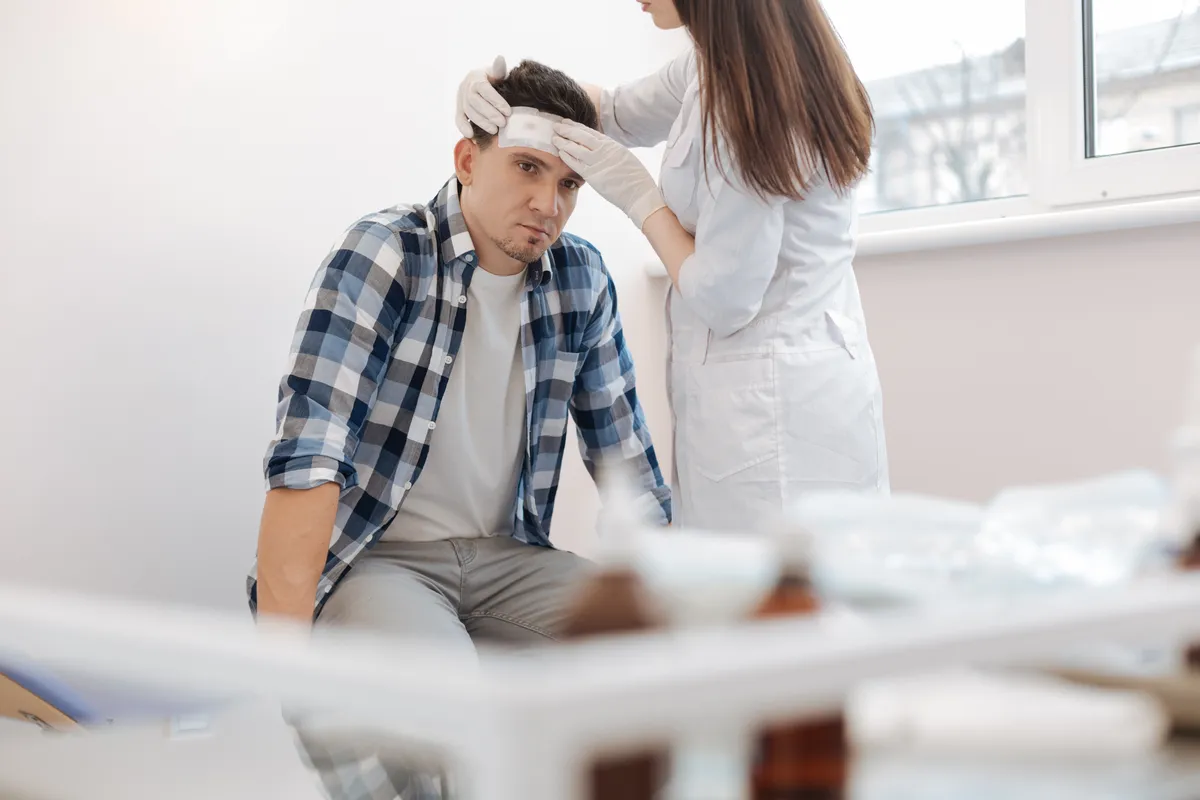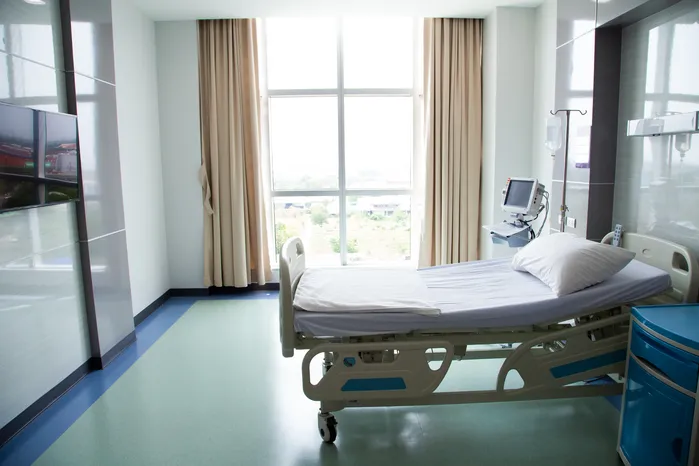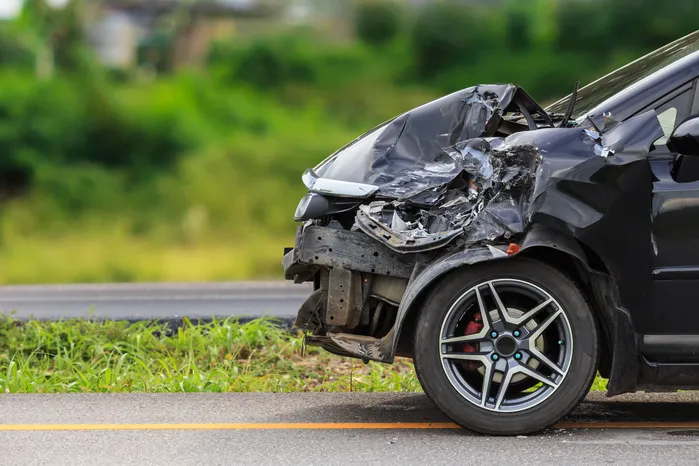8 min read time
Table of Contents
No, you should not drive with a concussion, as it puts you at a higher risk for a car accident and may result in legal punishments.
What is a Concussion
A concussion is a type of traumatic brain injury that occurs when a strike to the head causes the brain to bounce around inside the skull.
This bouncing can cause brain changes and sometimes damage to the brain cells. Symptoms of a concussion include:
- Headaches
- Dizziness
- Confusion
- Blurred vision
- Nausea
- Sensitivity to light and noise
- Difficulty concentrating or remembering
- Fatigue
These symptoms can vary in severity and duration but will impact your ability to do daily tasks, including driving.
The Effects of a Concussion on Driving
Driving requires a high level of cognitive function, quick decision-making, and precise motor skills.
Most concussion symptoms can significantly impair these abilities. For example:
- Slower Reaction Times: Concussions can slow down reaction times, making it hard to respond to sudden changes in traffic or unexpected obstacles.
- Impaired Concentration: Concentration is vital to safe driving. Concussion symptoms like confusion and difficulty concentrating can lead to poor decisions on the road.
- Vision Problems: Blurred or double vision can make it hard to clearly see road signs, signals, or other vehicles.
- Dizziness and Balance Issues: Dizziness can affect a driver's ability to control the vehicle safely and stay in their lane.
- Fatigue: Excessive fatigue can lead to drowsy driving, increasing the risk of a car accident.
Can You Drive with a Mild Concussion
No, don't drive with a mild concussion. Even mild concussion symptoms like headaches, dizziness, confusion, difficulty concentrating, and minor vision problems can impair your ability to drive safely.
Health professionals generally recommend not driving until all symptoms have resolved and you've been cleared by a doctor.
Driving with any degree of cognitive or physical impairment increases the chances of accidents and puts not just you but others on the road at risk.
In summary, do not drive with a mild concussion. Prioritize your health and safety by following medical advice and waiting until you fully recover.
Is It Legal to Drive with a Concussion?
The legality of driving with a concussion varies by state but is generally not recommended and could be illegal if you can't drive safely. Here are some key points to consider:
Legal Considerations
- Impaired Driving Laws: There are strict laws against driving impaired in the U.S. that apply to alcohol and drugs but can also apply to any condition that affects your ability to drive safely. A concussion can impair cognitive and motor functions, which makes it unsafe and possibly illegal to drive.
- Duty to Report Medical Conditions: Some jurisdictions require you to report medical conditions that could affect your ability to drive to the licensing authority. Failing to do so, especially if you're in a car accident, could have legal consequences.
- Doctor’s Instruction: If a doctor tells you not to drive due to a concussion and you ignore that advice and get in an accident, that could be considered negligent behavior and could be used against you in a personal injury claim.
Other Considerations
- Insurance: Driving against medical advice can also impact insurance claims. If you get in an accident while driving with a concussion, your insurance company may not cover the damage.
- Legal Liability: If you get in an accident and it's found out you were driving with a concussion, you could be liable for any injuries or damage.
How Long Should I Wait to Drive After a Concussion?
It depends on your symptoms and what your doctor says, but typically, you should wait around 24-48 hours before driving.
Here are some guidelines to help you know when it's safe to get back behind the wheel:
Initial Recovery Period
After a concussion, seek medical attention and rest. Do not do anything that requires a lot of concentration or physical activity, including driving, and avoid bright lights for at least 24-48 hours.
Monitor your symptoms during the initial recovery period. Headaches, dizziness, confusion, fatigue, difficulty concentrating, and vision changes are common.
Ahere to Medical Advice
Always see a doctor before driving. They will evaluate your symptoms and may do tests to check your cognitive and motor functions. They will give you personalized guidance based on your condition.
Your healthcare provider may recommend gradually returning to normal activities, including driving.
They may say to start with less demanding tasks and gradually increase your activity level as your symptoms improve.
Ensure You Are Ready to Drive
Ensure you are symptom-free before driving. That means no headaches, dizziness, confusion, vision problems, or fatigue.
Test your readiness to drive by doing activities that require concentration, quick reactions, and clear vision.
You can test your readiness by reading, working on a computer, or playing video games. If these activities don’t worsen your symptoms, you should be able to drive again.
When you feel ready, start with short, familiar routes in low-traffic areas to test your comfort and ability behind the wheel. Gradually increase the duration and complexity of your drives as you gain confidence.
Driving Precautions to Take After a Brain Injury
When you start driving again, have someone with you. They can take over if you have suspected concussion symptoms or feel unwell.
In addition, do not drive in challenging conditions, such as at night, in bad weather, or in heavy traffic, until you fully feel back to normal.
General Traumatic Brain Injury Recovery Timeline
Recovery time varies, but most people feel better within a few days or a couple of weeks.
Some who experience more a severe concussion may have more prolonged symptoms.
However, it's important to understand that your concussion recovery will differ from others. It's best to follow your doctor’s advice rather than a timeline.
What Are You Not Allowed to Do with a Concussion?
A concussion is a medical condition that requires proper care and rest to heal. Here's a checklist of what not to do if you have a concussion:
Physical Activities
- No Intense Exercise: Running, weightlifting, and contact sports can worsen concussion symptoms and delay recovery.
- No High-Risk Sports: Don't play sports that can cause a head injury, such as football, soccer, hockey, boxing, and other contact sports, until cleared by a doctor.
- Limit Physical Activity: Non-intense activities like biking, swimming, and dancing should be avoided initially, as they can worsen symptoms like dizziness and headaches.
Cognitive Activities
- Reduce Screen Time: Limit the use of computers, smartphones, tablets, and televisions. Prolonged screen time can strain your eyes and worsen symptoms like headaches and fatigue.
- No Intense Mental Work: Activities that require intense concentration and mental effort, such as reading or studying, should be minimized.
- Limit Work and School: Depending on the severity of your concussion, you may need to take time off from work or school. Cognitive rest is crucial to healing; returning to everyday life too soon can impede recovery.
Sensory Stimulation
- No Loud Noises: Exposure to loud environments like concerts, crowded places, or construction sites can worsen symptoms like headaches and noise sensitivity.
- Minimize Bright Lights: Bright or flashing lights, including those from screens, can increase sensitivity and discomfort. Use dim light on your devices and avoid places with too much lighting.
Daily Activities
- Don’t Drive: As mentioned earlier, driving requires full cognitive and motor functions. Drive until you are symptom-free and cleared by a doctor.
- No Alcohol: Alcohol can impair cognitive functions and interact with concussion symptoms. It's best to avoid alcohol until you are fully recovered.
- Limit Decision Making: Avoid making important decisions or activities that require critical thinking and judgment until symptoms are gone.
How Long Does a Mild Concussion Last?
Symptoms of a mild concussion last from a few days to several weeks.
Here are the key factors that affect recovery time and what to expect during the healing process:
Typical Recovery Timeline
- First 24-48 Hours: Symptoms like headaches, dizziness, confusion, and fatigue are usually at their worst during the first 24-48 hours after the injury. Rest and limited activity are key during this time.
- First Week: Many people start to feel better within the first week. Cognitive and physical rest continues to be important, and sudden movement should be avoided. Symptoms like headaches, difficulty concentrating, and mild dizziness may still be present but should start to subside.
- Two to Three Weeks: Most people with mild concussions see significant improvement or complete recovery within two to three weeks. Gradual return to normal activities, such as driving a motor vehicle, is often possible.
- Up to Three Months: While most people recover within a few weeks, some older adults may experience lingering symptoms, known as post-concussion syndrome, which can last for several months. These symptoms can include headaches, difficulty concentrating, memory issues, and fatigue.
Factors That Effect Recovery
- The Severity of the Concussion: Even within mild concussions, the severity can vary and affect recovery time. Auto accidents or sports-related concussions may result in longer-lasting symptoms.
- Age: A Younger concussion patient may take longer to recover from concussions than adults. The developing brain is more susceptible to injury and slower to heal.
- Previous Concussions: According to a Centers for Disease Control report, a history of multiple concussions can mean longer recovery times and increased sensitivity to future injuries.
- Overall Health: General health and fitness can play a role in recovery. Those with pre-existing health conditions or poor physical fitness may have longer recovery times.
- Following Medical Advice and Rest: Following medical advice, getting enough rest, and avoiding activities that worsen symptoms are key to recovery. Not resting and not managing symptoms properly can prolong recovery.
Contact a Las Vegas Car Accident Attorney Today
If you were injured in a Las Vegas car accident and seek maximum compensation, contact our Nevada personal injury attorneys today.
With over 20+ years of experience in personal injury law, our attorney can fully compensate you for your medical bills, physical pain, lost wages, and other damages through a personal injury claim.
Speak with a lawyer today by calling (702) 566-3600 or submitting a message.
Obtain the Compensation You're Entitled To
Contact Us Today
Rodney Okano Car Accident Lawyer is a Las Vegas personal injury law firm with over 20 years of experience helping clients obtain maximum compensation following injuries from accidents such as car crashes, worksite injuries, and slips and falls. Over those years, The Rodney Okano Car Accident Lawyer Law Firm has become an experienced law firm that can ensure exceptional results for any of its clients.



